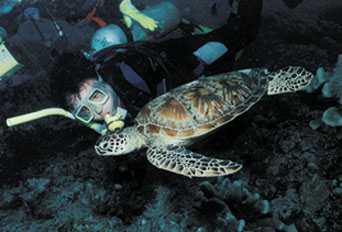To be a qualified diver is not as difficult as most people think
By Mimi Lok
In the past, most Hong Kong people have not made much of a distinction between water sports and swimming. But as diving has become more trendy, with thousands of new divers each year, the variety of watersports has been enriched.
In the 1950s, some Westerners brought this new and exciting sport to Hong Kong. At that time, few Chinese could afford the activity.
The sport localised only when the economy of Hong Kong improved later on.
There are two kinds of diving: skin diving and scuba diving.
Skin diving takes place in shallow water for short durations. Skin divers dive by holding their breath and they spend most of their time at the surface of the water. This type of diving is economical and it does not require any special training. Only basic equipment such as a mask, fins, a snorkel and a wet suit are needed.
On the other hand, a scuba diver stays under water much longer. He or she can move more freely and has a closer contact with the underworld. Basic equipment includes an air tank, a buoyancy control device, a compass gauge, and a pressure and depth gauge.
The word scuba originally was an abbreviation for “self-contained underwater breathing apparatus”.
 Not every one can go scuba diving alone. Only those who hold certificates are qualified to dive on their own without the permission of instructors.
Not every one can go scuba diving alone. Only those who hold certificates are qualified to dive on their own without the permission of instructors.
To be a qualified diver, one has to be over 12 years old, physically healthy and able to swim. Those with high blood pressure, who have disease or who suffer from epilepsy are discouraged from scuba diving. A certification card is awarded to people who successfully pass a training course.
Certification cards are issued by the Hong Kong Underwater Association, the World Underwater Federation, the National Association of Underwater Instructors, and the Professional Association of Diving Instructors. Card holders are acknowledged by all diving shops and instructors as qualified divers. Without the card, one can hardly dive.
The training course provides lectures introducing the necessary knowledge of diving, and there is pool training that provides a safe environment for beginners. Besides, there is open sea training that provides skills and real practice. The course fee is around $3,000.
One enthusiast is Mr. Simon Yu, an instructor at Paradive Lt.
“It is really a paradise,” he said. “The underworld is so silent and peaceful that make me trouble-free. I enjoy it a lot.
“We usually go to East Sai Kung for diving. Long Ke Wan, Tai Long West and Pak Lap Wan are popular spots also. The water quality is acceptable there,” said Mr. Yu.
Another local scuba diver is Dr. Memie Kwok, a physician at The Chinese University of Hong Kong.
“What attracts me most to diving is the sense of freedom. It is very wonderful because I can enter an anti-gravitational state,” said she.
“I think diving is educational because one can know more about marine biology, see different kinds of marine creatures and experience how beautiful nature is,” added Dr. Kwok.
According to her, divers can learn to be more responsible too. They can learn how to cooperate with and take care of their partners since they have to dive in pairs.
Another skilled diver is Mr. Leung Lap Shun, 24. His most unforgettable memory is about sharks around the Maldives.
“The sharks did not attack, me and they just swim past. They viewed me as a special kind of fish,” said Mr. Leung.
Nevertheless, Dr. Kwok does not take all the marine organisms for granted since some of her friends were once attacked by an octopus.
“Despite of its advantages, diving is a dangerous sport. You do not know what will happen next. Sometimes there are problems in the equipment. A diver should check the gear properly. They should also keep calm when unanticipated events like cold currents and decompressions occur,” she explained.
 “Divers need to go through medical check beforehand. Hearts, lungs and ear drums are of main concerns. But even a paralysed man can dive,” commented Dr. Kwok.
“Divers need to go through medical check beforehand. Hearts, lungs and ear drums are of main concerns. But even a paralysed man can dive,” commented Dr. Kwok.
In Hong Kong, pollution is a serious problem. The water is muddy and only few kinds of fish can survive.
Thus many divers choose to dive in other countries.
Mr. Yu said, “Diving in foreign countries is a recent trend. The water quality is much better.
“Diving is also seasonal in Hong Kong. People can only dive from April to October. This is a constraint to many people. In addition, sharks are another problem.
“Many divers usually form tour groups themselves.
“Our company organizes many tour groups for diving. The Philippines, Australia’s Great Barrier Reef, Malaysia and the Red Sea are the most popular spots.
“Due to the trend, many diving shops have changed their strategy. They use Hong Kong as a training centre and then they arrange qualified divers to dive in other countries,” said Mr. Yu.
Dr. Kwok said, “I haven’t dived in Hong Kong for several years because the water here is very cold and there are not many things to look at. “I’d rather go to the Philippines and the Red Sea to dive.”
Although diving is a sport aiming for pleasure, divers can actually be divided into several levels.
Open water divers are the most basic type. After attending several training courses, divers are classified as advanced divers. One needs to dive 60 times before he or she can become a certificated master diver.
The upper levels are assistant instructors and instructors. They can teach others to dive.
Diving frequently, one can be an instructor within a year.

